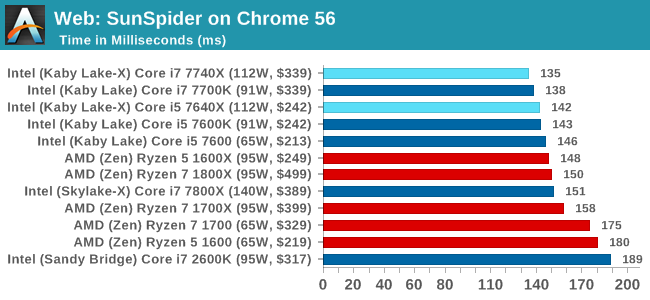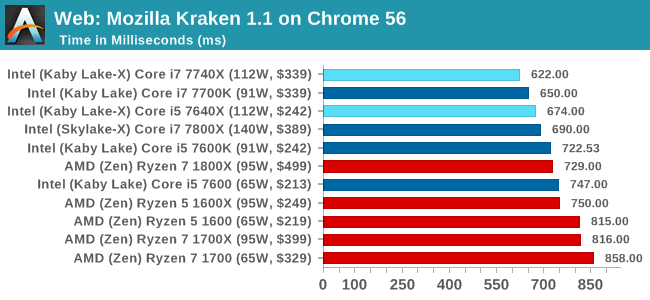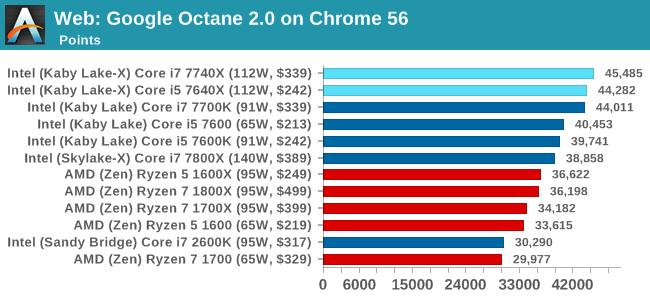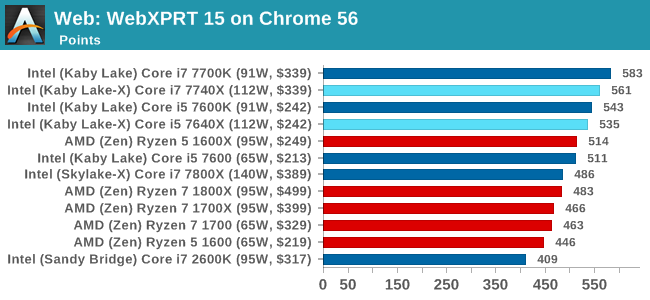The Intel Kaby Lake-X i7 7740X and i5 7640X Review: The New Single-Threaded Champion, OC to 5GHz
by Ian Cutress on July 24, 2017 8:30 AM EST- Posted in
- CPUs
- Intel
- Kaby Lake
- X299
- Basin Falls
- Kaby Lake-X
- i7-7740X
- i5-7640X
Benchmarking Performance: CPU Web Tests
One of the issues when running web-based tests is the nature of modern browsers to automatically install updates. This means any sustained period of benchmarking will invariably fall foul of the 'it's updated beyond the state of comparison' rule, especially when browsers will update if you give them half a second to think about it. Despite this, we were able to find a series of commands to create an un-updatable version of Chrome 56 for our 2017 test suite. While this means we might not be on the bleeding edge of the latest browser, it makes the scores between CPUs comparable.
All of our benchmark results can also be found in our benchmark engine, Bench.
SunSpider 1.0.2: link
The oldest web-based benchmark in this portion of our test is SunSpider. This is a very basic javascript algorithm tool, and ends up being more a measure of IPC and latency than anything else, with most high-performance CPUs scoring around about the same. The basic test is looped 10 times and the average taken. We run the basic test 4 times.

SunSpider has a single threaded focus, and we see the Kaby Lake-X processors take their spots at the top of the graph.
Mozilla Kraken 1.1: link
Kraken is another Javascript based benchmark, using the same test harness as SunSpider, but focusing on more stringent real-world use cases and libraries, such as audio processing and image filters. Again, the basic test is looped ten times, and we run the basic test four times.

Mozilla too relies on single threaded IPC and frequency.
Google Octane 2.0: link
Along with Mozilla, as Google is a major browser developer, having peak JS performance is typically a critical asset when comparing against the other OS developers. In the same way that SunSpider is a very early JS benchmark, and Kraken is a bit newer, Octane aims to be more relevant to real workloads, especially in power constrained devices such as smartphones and tablets.

Octane is an interesting benchmark, requiring cores and ST performance, but mostly the latter. It also seems that either Intel's design is optimized for the benchmark or vice versa, given the substantial difference in performance. There's no way for the benchmark to use all of the threads from AMD, nor the 12 threads in the Core i7-7800X which has a lower single thread performance.
WebXPRT 2015: link
While the previous three benchmarks do calculations in the background and represent a score, WebXPRT is designed to be a better interpretation of visual workloads that a professional user might have, such as browser based applications, graphing, image editing, sort/analysis, scientific analysis and financial tools.

WebXPRT is a mix of ST and MT, but still based in the web and relies on ST performance a lot. Given the variable loading on the benchmark, Intel's newest features such as Speed Shift help keep it at the top.










176 Comments
View All Comments
mapesdhs - Monday, July 24, 2017 - link
Ok, you get a billion points for knowing Commodore BASIC. 8)IanHagen - Monday, July 24, 2017 - link
Dr. Ian, I would like to apologize for my poor choice of words. Reading it again, it sounds like I accused you of something which is not the case.I'm merely puzzled by how Ryzen performs poorly using msvc compared to other compilers. To be honest, your finds are very relevant to anyone using Visual Studio. But again, I find Microsoft's VS compilar to be a bit of an oddball.
A few weeks ago I was running my own tests to determine wether my Core i5 4690K was up to my compiling tasks. Since most of my professional job sits on top of programming languages with either short compile times or no compilation needed at all, I never bothered much about it. But recently I've been using C++ more and more during my game development hobby and compile times started to bother me. What I found puzzling is that after running a few test I couldn't manage to get any gains through parallelism, even after verifying that msvc was indeed spanning all 4 threads to compile files. Than I tried disabling two cores and clocking the thing higher and... it was faster! Not by a lot, but faster still. How could it be faster with a 50% decrease in the number of active cores and consequently threads doing compile jobs? I'm fully aware that linking is single threaded, but at least a few seconds should be gained with two extra cores, at least in theory. Today I had the chance to compile the same project on a Core i7 7700HQ and it was substantially slower than my Core i5 4690K even with clocks capped to 3.2 GHz. In fact, it was 33% slower than my Core i5 at stock speeds.
Anyhow… Dr. Ian’s findings are a very good to point out to those compiling C++ using msvc that Skylake-X is probably worth it over Ryzen. For my particular case, it would appear that Kaby Lake-X with the Core i7 7740X could even be the best choice, since my project somehow only scales nicely with clocks.
I just would like to see the wording pointing out that Skylake-X isn’t a better compiling core. It’s a better compiling core using msvc at this particular workload. On the GCC side of things, Ryzen is very competitive to it and a much better value in my humble opinion.
As for the suggestion, I’d say that since Windows is a requirement trying to script something to benchmark compile times using GCC would be daunting and unrealistic. Not a lot of people are using GCC to work on the Windows side of things. If Linux could be thrown into the equation, I’d suggest a project based on CMake. That would make it somewhat easy to write a simple script to setup, create a makefile and compile the project. Unfortunately, I can not readily think of any big name projects such as Chromium that fulfill that requirement without having to meddle with eventual dependency problems as the time goes by.
Kevin G - Monday, July 24, 2017 - link
These chips edge out their LGA 1151 counter parts at stock with overclocking also carrying a slight razor edge over LGA 1151 overclocks. There are gains but ultimately these really don't seem worth it, especially in light of the fragmentation that this causes the X299 platform. Hard to place real figures on this but I'd wager that the platform confusion is going to cost Intel more than what they will gain with these chips. Intel should have kept these in the lab until they could offer something a bit more substantial.mapesdhs - Monday, July 24, 2017 - link
I wonder if it would have been at least a tad better received if they hadn't cripplied the on-die gfx, etc.DanNeely - Tuesday, July 25, 2017 - link
LGA2066 doesn't have video out pins because it was originally designed only for the bigger dies that don't include them; and even if Intel had some 'spare' pins it could use adding video out would only make already expensive mobos with a wide set of features that vary based on the CPU model even more expensive and more confusing. Unless they add a GPU to either future CPUs in the family (or IMO a bit more likely) a very basic one to a chipset variant (to remove the crappy one some server boards add for KVM support) keeping the IGP fully off in mainstream dies on the platform is the right call IMO.DrKlahn - Monday, July 24, 2017 - link
Great article, but the conclusion feels off:"The benefits in the benchmarks are clear against the nearest competition: these are the fastest CPUs to open a complex PDF, at the top for office work, and at the top for most web interactions by a noticeable amount."
In most cases you're talking about a second or less between the Intel and AMD systems. That will not be noticeable to the average office worker. You're much more likely to run into scenarios where the extra cores or threads will make an impact. I know in my own user base shaving a couple of seconds off opening a large PDF will pale in comparison to running complex reports with 2 (4 threads) extra cores for less money. I have nothing against Intel, but I struggle to see anything in here that makes their product worth the premium for an Office environment. The conclusion seems a stretch to me.
mapesdhs - Monday, July 24, 2017 - link
Indeed, and for those dealing with office work it makes more sense to emphasise investment where it makes the biggest difference to productivity, which for PCs is having an SSD (ie. don't buy a cheap grunge box for office work), but more generally dear god just make sure employees have a damn good chair to sit on and a decent IPS display that'll be kind to their eyes. Plus/minus 1s opening a PDF is a nothingburger compared to good ergonomics for office productivity.DrKlahn - Tuesday, July 25, 2017 - link
Yeah an SSD is by far the best bang for the buck. From a CPU standpoint there are more use cases for Ryzen 1600 than there is the i5/i7 options we have from HP/Dell. Even the Ryzen 1500 series would probably be sufficient and allow even more per unit savings to put into other areas that would benefit folks more.JimmiG - Monday, July 24, 2017 - link
The 7740X runs at a just over 2% higher clock speed than the 7700X. It can overclock maybe 4% higher than the 7700X. You'd really have to be a special kind of stupid to pay hundreds more for an X299 mobo just for those gains that are nearly within the margin of error.It doesn't make sense as a "stepping stone" onto HEDT either, because you're much better off simply buying a real HEDT right away. You'll pay a lot more in total if you first get the 7740X and then the 7820X for example.
mapesdhs - Monday, July 24, 2017 - link
Intel seems to think there's a market for people who buy a HEDT platform but can't afford a relevant CPU, but would upgrade later. Highly unlikely such a market exists. By the time such a theoretical user would be in a position to upgrade, more than likely they'd want a better platform anyway, given how fast the tech is changing.